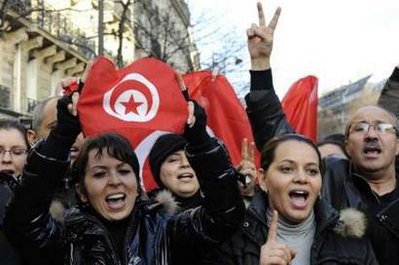Tunisians Overthrow Dictator; World Watches and Waits

Last week’s street demonstrations and overthrow of Tunisian dictator Zine El Abidine Ben Ali were fascinating and inspiring to behold.
As a believer in democracy who cheers people everywhere who show the courage to demonstrate – even on fear of death – for their freedom, I can’t help but view this development as a positive sign for democracy and human rights. People long denied basic human freedoms are drinking that elixir and celebrating; this is heady stuff.
Yet I am cautious to jump to firm conclusions about what the future holds. Reporter Josh Lipowsky of The New Jersey Jewish Standard has an interesting opinion piece in this week’s issue of The Standard, which will appear online shortly. He argues that, rather than signaling the advance of democracy in the mideast, this revolution and other instability in the region–such as Hezbollah’s military drills staging a takeover of Beirut this week– may usher in the ascension of Islamist radicals who have been held comparatively in check by repressive, autocratic regimes.
Yet the facts that the Tunisian people turned out in such numbers, facing the threats of tear gas, beatings, and worse, and that they did not engage in violence or proclaim a religious objective (my understanding is that by and large democracy was their rallying cry) gives me hope that they are not at all like those such as Hezbollah who would foment instability for violent, Islamic-supremacist purposes.
Of course, no one knows what Tunisia’s new government will look like, but I am cautiously optimistic. After all, any government with a 33-year-old minister of “youth and sports” who reports via Twitter on otherwise-closed government meetings and balks at having to wear a tie probably isn’t all bad.
According to The New York Times, some believe the Wikileaks’ release of hundreds of U.S. diplomatic cables that “revealed the underside of Arab regimes,” including that of Tunisian dictator Zine El Abidine Ben Ali – helped foment the revolution.
What makes a people worthy of democracy – indeed, what makes democracy function – is the willingness of people to be informed, to participate in self-governance, and to respect the rule of law. From what I have seen so far, Tunisians are demonstrating willingness and competence on these fronts. This week could be a turning point for the middle east.
This entry was written by Heather Robinson and posted on January 23, 2011 at 12:14 am and filed under Blog. permalink. Follow any comments here with the RSS feed for this post. Keywords: democracy, dissidents, human-rights. Post a comment or leave a trackback: Trackback URL. */?>



